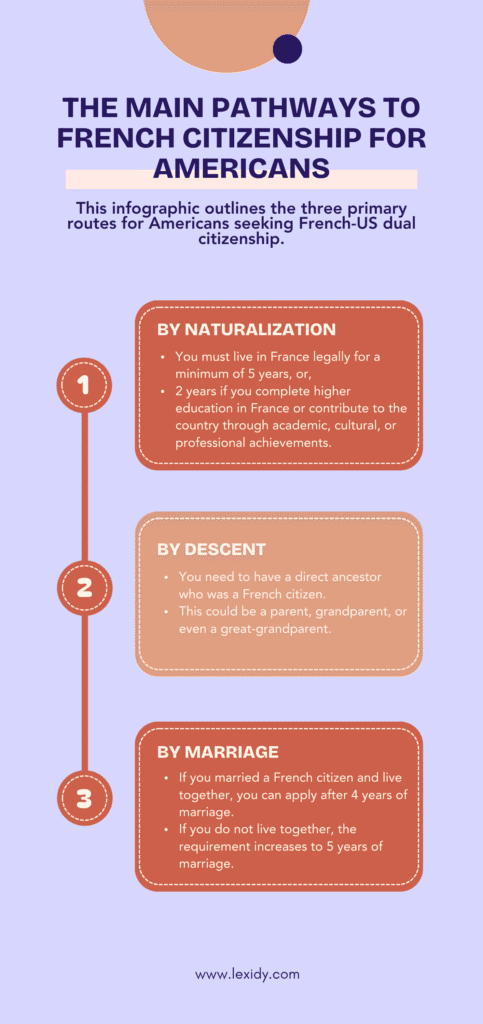Looking to gain a French passport while keeping your American citizenship? Good news! France allows dual nationality, meaning U.S. citizens can obtain French-US dual citizenship without giving up their American passport. French law does not require foreigners to renounce their original nationality. The United States also recognizes dual nationality, making this an entirely legal and achievable goal.
In this blog, we explain how you can get dual citizenship in France as a U.S. citizen in 2025. We will cover the main legal pathways, citizenship requirements for France, and the application steps involved.
Whether your connection to France is through residence, marriage, or ancestry, this article will help you understand what’s required to successfully secure French-US dual citizenship.
Table of Contents
The Main Paths to French Citizenship for US Citizens

There are three primary routes for Americans seeking French-US dual citizenship. These are either through naturalization (residency), marriage, or descent. Each path has distinct eligibility rules, timelines, and documentation requirements.
1. Citizenship by Naturalization (Residency)
This is the most common pathway for U.S. expats living in France. To apply for French citizenship through naturalization, you must have lived legally and continuously in France for a minimum of five years.
There are some exceptions to this five-year rule. The residency requirement is reduced to two years if you have completed higher education in France or contributed significantly to the country through academic, cultural, or professional achievements.
Eligibility Requirements:
- Language Proficiency: You must demonstrate a B1 level in French, verified through an approved language test.
- Financial Stability: Proof of sufficient and stable income.
- Integration: Evidence of integration into French society, including knowledge of French culture, history, and values, is typically assessed during an interview.
2. Citizenship by Marriage
If you are married to a French citizen, you can apply for French citizenship after four years of marriage. This is provided that the marriage remains valid, the couple lives together, and the French spouse has retained their nationality.
If the couple has not lived together in France, the required period increases to five years. The applicant will also be required to demonstrate basic French language proficiency and knowledge of French civic life.
3. Citizenship by Descent (Filiation)
Under the law of descent, anyone born to at least one French parent might automatically acquires French citizenship through ancestry, regardless of where they were born.
When claiming French-American dual citizenship through ancestry, it may be necessary to prove the parents’ nationality and an ongoing connection to France.
This route is often pursued by Americans of French heritage seeking to reclaim French nationality and reconnect with their ancestral roots.
Important Requirements for Naturalization Applicants (2025 Update)
Before pursuing French-US dual citizenship, it’s essential to understand that France places strong emphasis on language proficiency, civic knowledge, and personal conduct.
Several updates are being implemented to France’s naturalization requirements. This is part of a broader modernization of the nationality process, with some key changes coming into effect in 2026.
Language Proficiency – ONLY FOR NATURALIZATION
Starting January 1, 2026, the required level of French for citizenship by naturalization will rise from B1 to B2 on the Common European Framework of Reference for Languages (CEFR).
What this means for applicants:
A B2 level indicates the ability to:
- Understand complex written and spoken French, including abstract or technical discussions.
- Engage in spontaneous and fluent conversations with native speakers.
- Produce clear, detailed text and express opinions with supporting arguments.
Accepted language tests include the DELF (Diplôme d’Études en Langue Française) and TCF (Test de Connaissance du Français), both recognized by French authorities.
Civic Integration
Also effective January 1, 2026, applicants will be required to pass a civic exam to demonstrate their understanding of French history, culture, and values.
This requirement aims to measure genuine integration into French society. This has been a long-standing pillar of applying for French citizenship.
The exam is typically administered during the naturalization interview and may include questions on topics from the French Republic’s principles and key historical events to cultural norms.
Criminal Record & Financial Stability
All applicants must meet the following general conditions:
- Clean Criminal Record: Applicants must not have been convicted of serious crimes or offenses incompatible with French citizenship. They may be asked for proof of a clean criminal history.
- Financial Stability: Proof of stable and sufficient income is mandatory. Applicants must show they can support themselves and any dependents without relying on state assistance.
French-American Dual Citizenship Application Process and Timeline

Applying for French-US dual citizenship involves careful preparation and patience. While France’s citizenship process is well-defined, it can be time-consuming.. Below is a realistic overview of what U.S. citizens can expect when applying for French citizenship in 2025.
1. Gathering Documents
Applicants must prepare official, translated, and sometimes legalized documents. The exact list may vary depending on the chosen pathway (naturalization, marriage, or descent).
Proper document authentication (such as apostilles and certified translations) is critical to avoid delays.
An experienced French citizenship lawyer can help you understand which documents you may need for your particular citizenship pathway.
2. Submission
Once complete, applications for citizenship in France are submitted to the local prefecture or Judicial Court, depending on your citizenship pathway. If you’re applying for citizenship by marriage and living outside France, you may submit your application through the French consulate in your country of residence.
After submission, the prefecture will issue a receipt confirming that the application has been officially filed and is under review.
3. Interview
Most Applicants are invited to an in-person interview, typically conducted at the prefecture. However, if you’re applying through citizenship by descent, this step is not required.
This interview aims to assess the applicant’s integration into French society, including their understanding of French values, history, and culture. The interviewer may also evaluate the applicant’s spoken French, even if they have already submitted a language certificate.
4. Processing Time
The review process can take 1 year to 2 years, depending on a number of variables. These include:
- The volume of applications at the local prefecture/Court
- The complexity of the applicant’s background (e.g., documents from multiple countries)
- The need for additional verification or supplementary documents
The process of obtaining French-American dual citizenship is structured but lengthy. Proper preparation, complete documentation, and the ability to prove strong French language skills can significantly improve the likelihood of success and reduce delays.
Frequently Asked Questions About French-US Dual Citizenship

Does the US allow dual citizenship with France?
Yes. The United States permits dual citizenship. American citizens can hold both U.S. and French nationality. When you acquire French-American dual citizenship, you do not lose your U.S. citizenship. However, you must continue to meet all U.S. obligations, including tax filing.
How long does it take to get French-American dual citizenship?
The process typically takes 1 to 2 years once the application is submitted. The timeline depends on the prefecture’s / Consulate’s/ Tribunal’s workload and the complexity of the applicant’s file. Preparing all required documents, translations, and apostilles can take several additional months before submission.
Do I have to give up my US passport?
No. You can hold both passports simultaneously. France fully recognizes dual nationality, so becoming a French citizen does not require renouncing your American nationality. This means you can travel, live, and work freely in both countries.
Can a French citizen lose their nationality?
In rare cases, yes, but only under specific legal circumstances. A French citizen may voluntarily renounce their nationality or lose it if they acquire another citizenship and explicitly request to give up French nationality. However, dual citizens are generally protected, and France does not revoke nationality solely for acquiring another passport.
Need Support Acquiring French-US Dual Citizenship?
Obtaining French-US dual citizenship opens the door to opportunity, culture, and freedom. As a dual citizen, you gain the right to live, work, and study anywhere in the European Union, enjoy France’s high-quality healthcare and education systems, and maintain the benefits of your U.S. citizenship.
While France does allow dual citizenship, the process of applying can be lengthy and administratively complex. With upcoming changes to citizenship requirements for France in 2025 and 2026, including higher language and civic standards, it’s more important than ever to prepare carefully and seek expert guidance.
If you’re ready to explore how to get dual citizenship in France and secure your future as a French-American national, fill out the form below to speak with one of our trusted citizenship experts who can guide you through every step.

